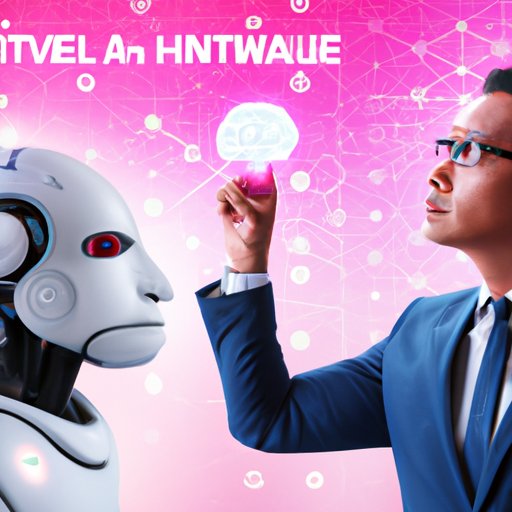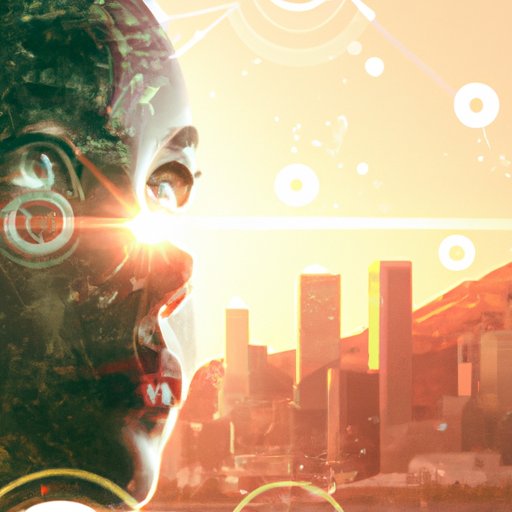Introduction
Artificial intelligence (AI) is a powerful tool that has changed how we interact with technology and how businesses operate. It is defined as “the ability of a computer program or a machine to think and learn”. AI is becoming increasingly prevalent in our lives, from digital assistants to self-driving cars. In this article, we will explore the advances of AI and its potential implications for society.

Examining the Benefits of AI and How Far We Have Come
AI offers many advantages over traditional methods of completing tasks. From improved efficiency and accuracy to automation of mundane tasks, AI has the potential to revolutionize many aspects of our lives. Let’s take a closer look at some of the benefits of AI.
Improved Efficiency
One of the primary advantages of AI is its ability to automate repetitive tasks and processes. This saves time and effort, allowing businesses to focus on more important tasks. According to research conducted by Gartner, “AI can reduce costs by 25% or more by 2023”. By reducing the need for manual labor, AI can increase overall efficiency and productivity.
Increased Speed and Accuracy
AI is also capable of performing tasks and analyzing data faster than humans. This increased speed can lead to more accurate results and better decision making. For example, AI can analyze large amounts of data quickly and accurately, allowing businesses to make informed decisions faster.
Automation of Tasks
Another benefit of AI is its ability to automate mundane tasks. AI algorithms can be trained to complete tasks that would otherwise require manual input. This automation can free up resources, allowing businesses to focus on more important tasks. For example, AI algorithms can be used for customer service, eliminating the need for human employees.
Analyzing Current AI Technologies and Their Impact on Society
AI technologies have advanced rapidly in recent years. Let’s take a look at some of the most popular AI technologies and their potential implications for society.
Machine Learning
Machine learning is one of the most popular AI technologies. It involves using algorithms to analyze data and identify patterns. These patterns can then be used to make predictions about future events. According to a study by McKinsey Global Institute, “machine learning could potentially create between $3.5 trillion and $5.8 trillion in value annually across nine business functions in 19 industries.” As machine learning continues to advance, it could revolutionize how businesses operate.
Natural Language Processing
Natural language processing (NLP) is another popular AI technology. It involves using algorithms to process and understand natural language. NLP can be used for tasks such as text summarization, sentiment analysis, and question answering. According to a study by Accenture, “NLP could add $1.2 trillion to the global economy by 2020.” NLP could revolutionize how we interact with computers, allowing us to communicate with them in a more natural way.
Computer Vision
Computer vision is an AI technology that uses algorithms to recognize objects in images and videos. This technology can be used for tasks such as facial recognition, object detection, and image classification. According to a study by Grand View Research, “the global computer vision market size was valued at USD 8.2 billion in 2019 and is expected to grow at a compound annual growth rate of 19.7% from 2020 to 2027.” As computer vision technology advances, it could revolutionize how we interact with the world around us.
Exploring the Ethical Implications of AI
While AI has many advantages, there are also potential ethical implications that need to be considered. Let’s take a look at some of the ethical concerns surrounding AI.
Privacy Concerns
One of the main ethical concerns surrounding AI is privacy. AI algorithms can collect and store vast amounts of personal data, which can be used for various purposes. This raises questions about who has access to this data and how it is used. According to a study by the European Commission, “it is essential to ensure that individuals’ privacy is respected and protected when using AI tools.”
Potential for Misuse
Another ethical concern is the potential for misuse of AI technologies. AI algorithms can be used for malicious purposes, such as tracking individuals or manipulating public opinion. According to a report by the National Academy of Sciences, “there is growing concern about the potential for misuse of AI technologies, including cyberattacks, surveillance, and manipulation of public opinion.”
Unintended Consequences
Finally, there is the potential for unintended consequences of AI technologies. AI algorithms can be difficult to control, and they can lead to unexpected outcomes. According to a study by the University of Oxford, “there is a risk that AI systems may produce undesirable outcomes due to unforeseen circumstances or erroneous assumptions.”
Investigating Impacts of AI on Businesses
AI has the potential to revolutionize how businesses operate. Let’s take a look at some of the potential impacts of AI on businesses.
Cost Savings
One of the main benefits of AI is cost savings. AI algorithms can automate mundane tasks, reducing the need for manual labor. This can lead to significant cost savings for businesses. According to a study by Deloitte, “AI could save businesses up to $100 billion annually in operational costs by 2022.”
Improved Decision Making
AI can also be used to improve decision making. AI algorithms can analyze large amounts of data quickly and accurately, allowing businesses to make more informed decisions. According to a study by McKinsey Global Institute, “AI could enable corporate leaders to make better decisions up to 50% of the time.”
Enhanced Customer Experience
Finally, AI can be used to enhance customer experience. AI algorithms can be used to personalize customer service, allowing businesses to provide more tailored services. According to a study by Accenture, “AI could help businesses increase revenue by up to 38% by 2035.”

Comparing AI to Human Intelligence
Although AI has come a long way, it still has limitations compared to human intelligence. Let’s take a look at some of the differences between AI and human intelligence.
Algorithms vs. Intuition
AI algorithms are designed to follow predetermined rules and procedures. This makes them reliable but also limited in their capabilities. On the other hand, human intelligence relies on intuition and creativity. Humans are capable of solving complex problems and making decisions based on their experience and knowledge.
Limitations of AI
AI algorithms are limited by their programming. They can only do what they are programmed to do, and they cannot think outside of the box. Additionally, AI algorithms can be prone to errors and biases, which can lead to inaccurate results.
Strengths of Human Intelligence
Humans are capable of doing things that AI algorithms cannot. We have the ability to interpret and understand complex concepts, use critical thinking, and be creative. Additionally, humans are capable of empathy, which allows us to connect with others in ways that AI algorithms cannot.

Looking at the Future of AI and What it Could Mean for Humanity
As AI technologies continue to advance, they could have both positive and negative impacts on humanity. Let’s take a look at some of the potential implications of AI on humanity.
Potential for Positive Change
AI has the potential to bring about positive change. It could be used to solve complex problems, automate mundane tasks, and improve decision making. According to a study by the World Economic Forum, “AI has the potential to contribute up to $15.7 trillion to the global economy by 2030.”
Potential for Negative Change
However, AI also has the potential to bring about negative change. It could be used for malicious purposes, such as tracking individuals or manipulating public opinion. Additionally, AI algorithms can be biased and prone to errors, leading to inaccurate results.
Need for Regulations
Given the potential implications of AI, there is a need for regulations to ensure that AI technologies are used responsibly. According to a report by the United Nations, “governments should develop and implement policies and regulations to ensure the responsible development and use of AI.”
Conclusion
In conclusion, AI has come a long way in recent years and has the potential to revolutionize many aspects of our lives. It offers many benefits such as improved efficiency, increased speed and accuracy, and automation of tasks. However, there are also potential ethical implications that need to be considered. Finally, there is a need for regulations to ensure that AI technologies are used responsibly.
(Note: Is this article not meeting your expectations? Do you have knowledge or insights to share? Unlock new opportunities and expand your reach by joining our authors team. Click Registration to join us and share your expertise with our readers.)
